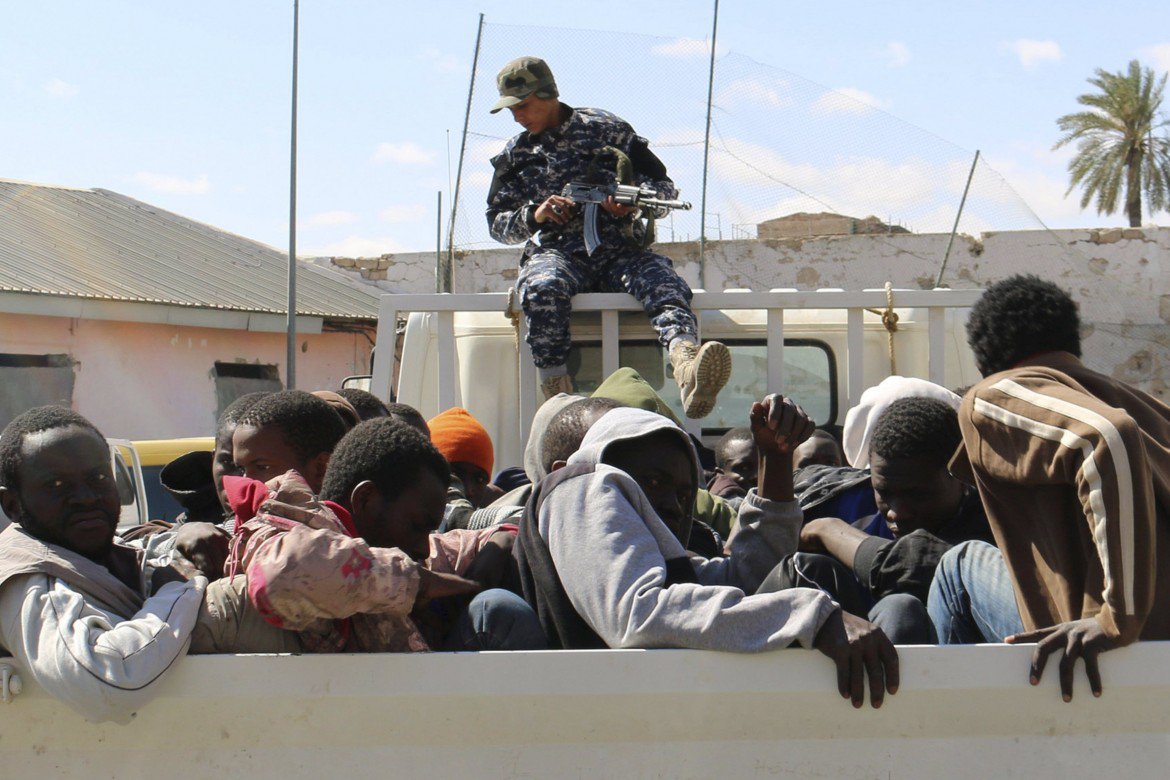Refugees
To stop migrants, Italy resurrects an old deal with Gaddafi
In a deal revived this week at a meeting in Libya, Italians would provide money and supplies in exchange for Tripoli’s help in blocking and repatriating migrants and refugees.

In order to stop the departures of migrants from Libya, Italy is ready to resurrect an agreement signed with Muammar Gaddafi in 2008 by the Berlusconi government. This was announced Monday by sources in the Tripoli government after a meeting held in Libya between Minister of Internal Affairs Marco Minniti, the interim Libyan Prime Minister Fayez al Serraj and Foreign Minister Taher Siyala.
At the summit, they reached bilateral agreements to mitigate immigration and terrorism in return — if the news from Tripoli is to be believed — for Italian investments in infrastructure (at the time, there was talk of €5 billion, a figure that seems to be confirmed now) and funding for flights that will send migrants back to their country of origin.
Minniti himself announced a few days ago his intention to travel to the North African country to discuss with Serraj how to put an end to boat departures. “Ninety-five percent of migrants take off from Libya, and it is clear that the phenomenon must be tackled there,” he said.
But no one would have imagined that his answer would be to dust off a deal that had only resulted in those fleeing war and misery to seek new routes. Italy now seems determined to try again. In particular, Rome is requesting Tripoli not only to prevent boats setting to sea but, above all, to step up controls at the country’s southern borders preventing the inflow from Niger, a country that’s become a crossroads for hundreds of thousands of desperate people hoping to reach Europe. As was promised to Gaddafi, Italy is prepared to provide a radar system to achieve this purpose.
It remains to be seen whether the plan will be implemented. For now, Serraj effectively controls only part of the government and he will hardly be able to guarantee the impermeability of the country’s southern borders.
The European Commission’s Sophia mission to train the Libyan Coast Guard is about to end. After the first phase, which involved the training at sea of 78 Libyan officers and non-commissioned officers, the second phase is about to be deployed in bases in Italy, Greece and Malta. The final stage is planned for the spring, which consists of the formation of eight Libyan patrol boats given to Libya from Italy in 2011. The boats had been held since then because of the Libyan conflict but will be delivered in the coming weeks.
The Mediterranean Sea will be the focus of political and military actions in the coming months. On Sunday, Minister of Defense Roberta Pinotti said, “It’s time to change the European mission’s actions against the smugglers. It’s time to move to the second phase in Libya and support the Libyan Navy to set controls in African waters. We need to do it in Libyan waters.”
It was a hasty announcement. In order to change the European mission from the control of international waters on the Libyan border, which has saved thousands of migrants’ lives, to the so-called “2Bravo” phase that foresees an entry into Libyan territorial waters, it actually requires a request from the Tripoli government and a U.N. resolution authorizing the intervention. Without these conditions, it would be considered an act of war. It is not clear how quickly this should happen. It took the Security Council months to pass a resolution authorizing the first phase of the European mission, due to Russia’s objections.
So, it is unthinkable that an operation closer to the Libyan coast, with all the risks that implies, would get the go-ahead quickly, even if this year Italy joins the Security Council as a non-permanent member. It was no coincidence that on Monday Foreign Minister Angelino Alfano, who yesterday participated in a Security Council meeting in New York, recalled that “in the Mediterranean Sea, the destiny of the world will unfold.”
The goal is always the same: Expand the European borders, thus putting an end to landings. “Just like the expenditure in Turkey to stop migrants,” Alfano said, “European funding must be made available to stop the departures by setting up deals with the African countries of origin and transit.”
Originally published at http://ilmanifesto.info/per-fermare-i-migranti-resuscita-il-vecchio-accordo-con-gheddafi/ on 2017-01-10
